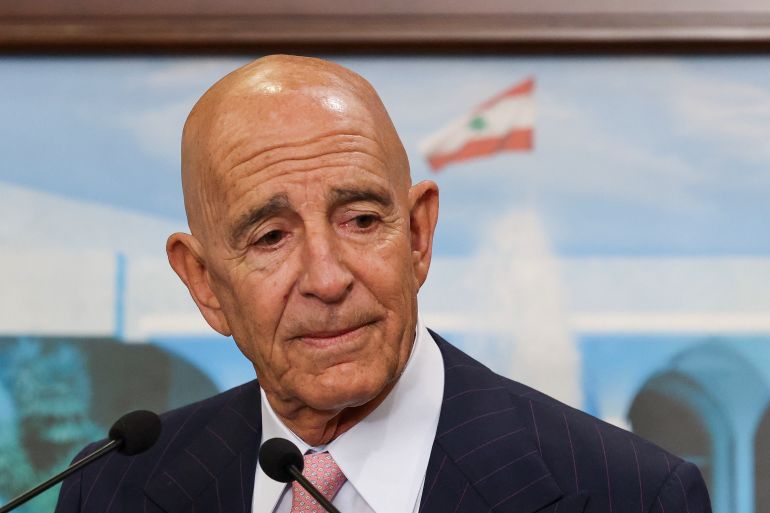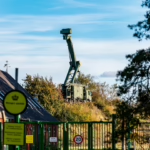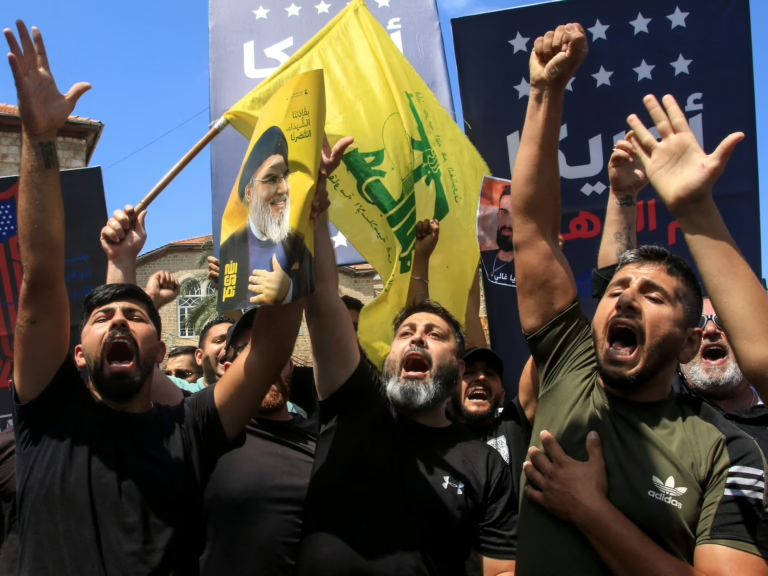One year after the targeted killing of Hassan Nasrallah by Israel, reports indicate that Hezbollah, the Lebanese organization he once led, is in the process of reorganizing.
Experts suggest that although Hezbollah’s strength has diminished to the point where it no longer poses a direct, substantial threat to Israel, the group remains capable of stirring unrest and challenging rivals within Lebanon as it seeks to maintain its political influence.
Historically regarded as the most formidable non-state armed faction in the Middle East, Hezbollah’s influence has notably declined over the past year, culminating in mounting international and domestic demands for the group’s complete disarmament.
Analysts warn that if efforts to disarm Hezbollah are mishandled, the group might retaliate aggressively, potentially igniting internal conflicts that could overshadow external pressures.
Despite these challenges, Hezbollah’s leadership continues to adopt a defiant stance. Naim Qassem, the current deputy leader, reaffirmed on Saturday during a large gathering at Nasrallah’s gravesite that the group will resist any Lebanese government attempts to strip it of its arms.
“Our weapons will never be surrendered or abandoned,” Qassem declared, emphasizing Hezbollah’s commitment to oppose any initiatives perceived as serving Israeli interests.
Current Situation and Ceasefire Dynamics
Hostilities between Hezbollah and Israel reignited on October 8, 2023, immediately following Israel’s offensive in Gaza. This conflict escalated until September 2024, when intensified Israeli military operations, including an invasion, resulted in approximately 4,000 Lebanese casualties, thousands injured, and mass displacement.
By the time a ceasefire was brokered on November 27, Israel had eliminated much of Hezbollah’s senior military command, including Nasrallah himself.
Although the ceasefire’s terms were vaguely defined, the general understanding was that both parties would halt attacks, Hezbollah would disarm in southern Lebanon, and Israeli forces would withdraw from the region. However, Israel and the United States soon insisted on Hezbollah’s full disarmament nationwide.
With Hezbollah weakened, its domestic and regional adversaries intensified calls for the group to relinquish its weapons. Many of Hezbollah’s former allies within Lebanon shifted their stance, endorsing complete disarmament.
Under pressure from the US and Israel, the Lebanese government announced on September 5 that the Lebanese Armed Forces would develop a strategy to disarm Hezbollah.
Meanwhile, Israel has repeatedly breached the ceasefire by conducting air and drone strikes in southern Lebanon, as reported by UNIFIL, the UN peacekeeping mission tasked with monitoring the ceasefire.
Despite speculation, particularly from anti-Hezbollah media, that the group is rebuilding its military capabilities in southern Lebanon, Hezbollah has only claimed responsibility for a single attack since the ceasefire began.
Experts agree that Hezbollah no longer possesses the capacity to threaten Israel significantly, suggesting that any Israeli military actions in Lebanon would be motivated by factors beyond Hezbollah’s current strength.
Hezbollah and its supporters argue that Israel’s ongoing violations of Lebanese sovereignty and occupation of several Lebanese territories justify maintaining armed resistance.
Ali Haidar, a columnist for the pro-Hezbollah publication Al-Akhbar, recently wrote, “The persistent threat necessitates sustaining deterrence and defense capabilities, as deterrence is a continuous process requiring a stable and cohesive power structure within a broader political framework.”
Understanding Hezbollah’s ‘Regrouping’
“No military or paramilitary organization would simply regroup after suffering a defeat as severe as Hezbollah’s last year,” stated Michael Young, a Lebanese political analyst.
He added, “They are not currently capable of launching rocket attacks or missile strikes against northern Israel or its cities.”
Lebanese political scientist Imad Salamey explained, “Hezbollah has been significantly weakened-losing leadership, suffering communication breaches, and facing disruptions in command and control. Their recovery will likely result in a smaller, more cost-effective, and agile organization.”
Salamey further noted that Israeli intelligence acknowledges both the damage inflicted on Hezbollah and the group’s efforts to rebuild through smuggling and local production, though any resurgence is expected to be limited and tactical rather than comprehensive in the near future.
The recent fall of Bashar al-Assad’s regime in Syria, a key Hezbollah ally, has further isolated the group by severing a critical land corridor for weapons and funding from Iran.
Nevertheless, Hezbollah appears to be leveraging its remaining influence through diplomatic channels, even reaching out to former adversaries such as Saudi Arabia.
In a speech on September 19, Qassem emphasized, “Our resistance is directed solely against the Israeli enemy, not Lebanon, Saudi Arabia, or any other entity.”
This message signals a strategic shift, as Saudi Arabia has historically supported Hezbollah’s rivals within Lebanon.
Young observed, “There is an indication that Hezbollah believes it can achieve more through political engagement than through armed conflict.”
This shift reflects the evolving political landscape in Lebanon and the broader region, where Israel and the US have gained influence while Iran, Hezbollah’s principal backer, has experienced setbacks.
Karim Emile Bitar, a Lebanese political analyst, remarked, “Hezbollah is beginning to recognize its constrained position.”
Before the conflict, Hezbollah wielded significant power to influence government formation. However, the election of President Joseph Aoun and Prime Minister Nawaf Salam in early 2025, neither favored by Hezbollah, demonstrated the group’s diminished sway.
Despite this, Hezbollah refrained from obstructing the establishment of Salam’s government, likely due to its urgent need for international aid to rebuild communities devastated by Israeli attacks.
However, reconstruction funds remain withheld amid ongoing debates over whether such aid should be contingent upon Hezbollah’s disarmament and broader political and financial reforms.
While Hezbollah retains the capacity to escalate tensions, analysts and diplomats note the group has largely refrained from provocative actions, influenced by growing support for the Lebanese state and the war fatigue among its members and supporters.
On Thursday, Hezbollah supporters gathered along Beirut’s coastline to honor Nasrallah’s memory, projecting his image onto the iconic Raouche Rocks despite government prohibitions.
This event was interpreted as both a tribute by supporters and a provocation by opponents. Yet, since the war, Hezbollah has mostly avoided confrontations, aside from brief roadblocks swiftly cleared by the Lebanese military.
A senior Western diplomat familiar with the situation suggested that if Hezbollah is regrouping militarily, it is more likely occurring in the Bekaa Valley rather than southern Lebanon, where ceasefire enforcement has been more effective.
Young added that Hezbollah, under Iranian guidance, seems to be recalibrating its political approach, potentially seeking compromises.
He highlighted proposals from Hezbollah-affiliated parliamentarians Ali Hassan Khalil and Ali Fayyad advocating for full implementation of the 1989 Ta’ef Accord, which ended Lebanon’s civil war, mandated militia disarmament, and called for a transition to a nonsectarian political system.
“Their underlying message is that if Ta’ef is fully enacted, Hezbollah could gain greater political representation, opening the door to discussions about its weapons,” Young explained.
Mounting Calls for Hezbollah’s Disarmament
As demands for Hezbollah’s disarmament intensify, experts and diplomats caution that excessive pressure could provoke a violent backlash from the group.
The United States has pledged $14.2 million in aid to bolster the Lebanese military’s capacity to disarm Hezbollah. High-profile visits by US officials, including Senator Lindsey Graham, Deputy Special Envoy Morgan Ortagus, and Special Envoy Tom Barrack, have amplified this pressure.
“It’s time for Hezbollah to be dismantled,” Graham declared during his August visit.
However, Lebanon’s military has resisted setting a firm deadline for disarmament, fearing that such a move could trigger internal conflict.

The US aid package has been met with skepticism in parts of Lebanon, where it is perceived as an attempt to use the Lebanese army to advance Israeli interests.
Parliament Speaker Nabih Berri, a Hezbollah ally, stated, “The Lebanese army will never act as Israel’s border guard. Its weapons are not instruments of discord; its sacred mission is to protect Lebanon and its people.”
Diplomats and analysts fear that a confrontation between the Lebanese army and Hezbollah could spark internal divisions along sectarian lines, reminiscent of the early stages of Lebanon’s civil war from 1975 to 1990.
“Forcing Hezbollah’s disarmament through military means is the worst possible scenario, yet this is the increasing pressure the US is placing on the Lebanese government,” Young told Al Jazeera.
“The Lebanese army is reluctant to pursue a forceful resolution because it wants to avoid direct conflict with Hezbollah.”

















